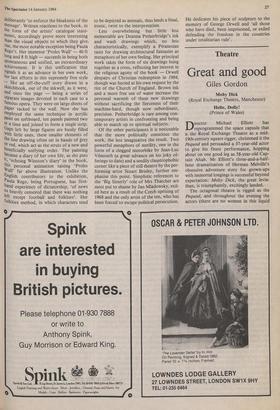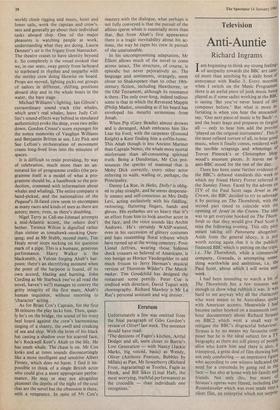Theatre
Great and good
Giles Gordon
Moby Dick (Royal Exchange Theatre, Manchester) Hello, Dolly!
(Prince of Wales)
Director Michael Elliott has reprogrammed the space capsule that is the Royal Exchange Theatre as a mid- 19th-century square rigger, christened it the Pequod and persuaded a 37-year-old actor to give his finest performance, hopping about on one good leg as 58-year-old Cap- tain Ahab. Mr Elliott's three-and-a-half- hour dramatisation of Herman Melville's obsessive adventure story for grown-ups with immortal longings is successful beyond expectation: Moby Dick, the great levia- than, is triumphantly, excitingly landed.
The octagonal theatre is rigged as the Pequod, and throughout the evening the actors (there are no women in this liquid
world) climb rigging and masts, hoist and lower sails, work the capstan and crow's- nest and generally go about their individual tasks aboard ship. One of the major pleasures is watching people at work, understanding what they are doing. Laurie Dennett's set is the frigate from Nantucket. The theatre ceases to have identity beyond it. So completely is the vessel evoked that we, in our seats, sway gently from larboard to starboard in rhythm and empathy with the motley crew doing likewise on board. Props are moved, lighting picks out groups of sailors in different, shifting positions aboard ship and in the whale boats in the water, the bare stage.
Michael Williams's lighting, Ian Gibson's extraordinary sound track (the whales, which aren't real whales, leave Judy Col- lins's sound-effects way behind in simulated authenticity) evoke the deep, even two miles down. Gordon Crosse's score expunges for the nonce memories of Vaughan Williams and Benjamin Britten at sea. Litz Pisk and Sue Lefton's orchestration of movement crams long-lived lives into the minutest of spaces.
It is difficult to resist providing, by way of celebration, much more than an an- notated list of programme credits (the pro- gramme itself is a model of what a pro- gramme should be, a handbook to the pro- duction, crammed with information about whales and whaling). The entire company is hand-picked, and the nationalities of the Pequod's ill-fated crew seem to encompass as many races and kinds of men as there are actors; more, even, as there's doubling.
Nigel Terry as Call-me-Ishmael attempts a mid-Atlantic accent, the others don't bother. Terence Wilton is dignified rather than sinister as tomahawk-smoking Quee- queg; and as Mr Stubb, second mate, Tim Healy never stops sucking on his question mark of a pipe. This is a humane, generous performance. Harry Walker is the blacksmith, a Vulcan forging Ahab's har- poon: there's an electrifying moment when the point of the harpoon is found, of its own accord, blazing and burning. John Cording as Mr Starbuck (we've all read the novel, haven't we?) manages to convey the gritty integrity of the first mate, Ahab's human inquisitor, without resorting to `character' acting.
As for Brian Cox's Captain, for the first 50 minutes the play lacks him. Then, quiet- ly he's on the bridge, the sound of his ivory heel heard against the crew's harmonious singing of a shanty, the swell and creaking of sea and ship. With the brim of his black hat casting a shadow over his scarred face, he's Rockwell Kent's Ahab to the life. He has smelt whale. The chase is on. Mr Cox looks and at times sounds disconcertingly like a more intelligent and sensitive Albert Finney, which does no harm. I find it im- possible to think of a single British actor who could give a more appropriate perfor- mance. He may or may not altogether plummet the depths of the night of the soul that are the novel but the obsession is there, with a vengeance. In spite of Mr Cox's mastery with the dialogue, what perhaps is not fully conveyed is that the pursuit of the albino sperm whale is essentially more than that. But from Ahab's first appearance there is a tragic inevitability about his ac- tions, the way he rapes his crew in pursuit of the unattainable.
In his uncompromising adaptation, Mr Elliott allows much of the novel to come across intact, The structure, of course, is episodic but never pejoratively so. The language and sentiments, strangely, seem closer to Shakespeare than to other 19th- century fiction, including Hawthorne, or the Old Testament, although its resonance is there. The only over-long, indeed tedious scene is that in which the Reverend Mapple (Philip Madoc, sounding as if his beard has enveloped his mouth) sermonises from Jonah.
When Pip (Gary Beadle) almost drowns and is deranged, Ahab embraces him like Lear his Fool, with the carpenter (Esmond Knight) a Kent finding him a coffin-home. This Ahab though is less Ancient Mariner than Captain Nemo, the whale more mortal misfortune than all-consuming spiritual truth. Being a Dundonian, Mr Cox pro- nounces the species of mammal that is Moby Dick correctly, every other actor referring to wails, wailing or, perhaps, the Principality.
Danny La Rue, in Hello, Dolly! is oblig- ed to play straight, and he seems desperate- ly uneasy and self-conscious as Mrs Dolly Levi, acting exclusively with his fiddling, twittering, fluttering fingers, hands and gloves. His eyelashes are so heavy that it's an effort from him to look another actor in the face, and the voice sounds like Archie Andrews. He's certainly WASP-wasted, even in his succession of glittery costumes and hats resembling floral tributes which have turned up at the wrong cemetery. Poor Lionel Jeffries, wearing those hideous check trousers so beloved of Americans, is too benign as Horace Vandergelder to add much frisson to Jerry Herman's musical version of Thornton Wilder's The Match- maker. Tim Goodchild has designed the restaurant scene prettily. Peter Coe is credited with direction, David Toguri with choreography. Richard Mawbey is Mr La Rue's personal assistant and wig dresser.







































 Previous page
Previous page